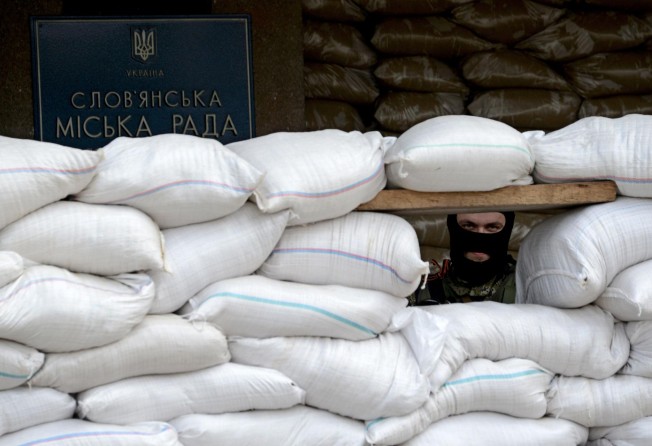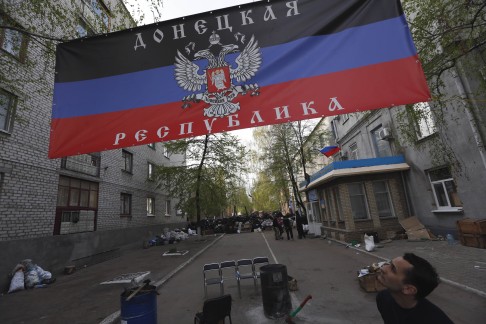Kiev says it won't attack pro-Moscow rebels over Easter
Washington warns of 'pivotal period' as pro-Moscow militants refuse to yield in eastern Ukraine, defying Geneva deal to defuse crisis

The Ukrainian government said it would not attack pro-Russian separatists over the Easter weekend as the US threatened Moscow with new sanctions if it fails to persuade the militants to surrender.
The Kremlin denies having control over gunmen who want their eastern regions to follow Crimea in being annexed by Russia. Moscow scolded Washington for treating it like a "guilty schoolboy" after their agreement in Geneva on Thursday that Ukrainian militants should disarm and vacate occupied buildings.
Ukraine's government, short of effective forces, has shown little sign of trying to recapture the dozen or so town halls, police stations and other sites seized over the past two weeks, despite proclaiming the launch of an "anti-terrorist operation".
The Foreign Ministry promised "the suspension of the active phase of the anti-terrorist operation" among a list of government initiatives to defuse the crisis issued late on Friday. A spokeswoman for the SBU state security service said yesterday the suspension was "linked to the implementation of the Geneva agreement and the Easter holidays".
"The anti-terrorist operation was put on hold for the Easter time and we will be not using force against them at this moment," Foreign Minister Andriy Deshchytsia was quoted yesterday as saying by the British Broadcasting Corp.
On Friday he warned the militants that "more concrete actions" could be taken this week if they failed to start surrendering to international peace monitors.
Deshchytsia met in Kiev yesterday with officials from the Organisation for Security and Co-operation in Europe, which includes both Nato members and Russia.
The OSCE will oversee implementation of the Geneva accord, under which Russia, Ukraine, the US and the European Union agreed to a process of disarmament and an end to occupations as part of wider programme to defuse the gravest East-West crisis since the end of the cold war.

After weeks of bitter mutual recriminations, Vladimir Putin held out the prospect of better relations with the West yesterday but the Russian president made clear it would depend on concessions from his adversaries in the crisis over Ukraine.
"I think there is nothing that would hinder a normalisation and normal co-operation," he said in an interview to be broadcast by Russian state television.
"This does not depend on us. Or rather not only on us. This depends on our partners."
US President Barack Obama's officials made clear on Friday that Russia must prevail on sympathisers in Ukraine to end the sit-ins within days or face graver economic sanctions.
Russia has long complained that Nato's extension of membership to Moscow's cold war satellites in eastern Europe and deepening ties to ex-Soviet states such as Georgia, Moldova and Ukraine is part of an aggressive policy to undermine it.
Putin's spokesman hit back on Friday at threats of sanctions from Washington, saying the United States treated Russia like a "guilty schoolboy".
Baltic states eye new Russian-language TV service in propaganda war
Europe's Baltic states are in talks to set up their own Russian-language television channel in a bid to counter the deluge of propaganda aimed at their ethnic Russian populations by Moscow-backed media.
Russian-language media outlets already exist in Estonia, Latvia and Lithuania but most emanate from Russia and toe its line on politics and history - sensitive issues in a region that endured half a century of Soviet occupation.
This month, Latvia and Lithuania each suspended the television channel Russia RTR for "inciting ethnic hatred". Vilnius had already taken two other stations off the air. The Ukraine conflict is at the heart of the idea for a joint Russian channel, giving the talks a sense of urgency. "The Russian-Ukrainian conflict has led to a situation where waiting any longer is unacceptable given the number of Russian channels being retransmitted in the Baltic states," said Ivars Belte, head of Latvian state broadcaster LTV. "The Russian-speaking audience needs a channel in a language it understands and which objectively reflects developments in the Baltic countries."
Latvia's prime minister and top diplomat have both held talks on the matter in recent weeks, with Foreign Minister Edgars Rinkevics taking to Twitter to voice his support for what he called "an effective tool to counter Russian official propaganda". But the idea is still at a theoretical stage, said Audrius Siaurusevicius, head of Lithuanian national broadcaster LRT.
Lithuanian President Dalia Grybauskaite has described the actions of Moscow-backed channels as "open information warfare".
She even alleged last year that Moscow was preparing a mudslinging campaign shortly before the Vilnius summit where Ukraine's decision to step away from an EU deal plunged the country into chaos.
Agence France-Presse